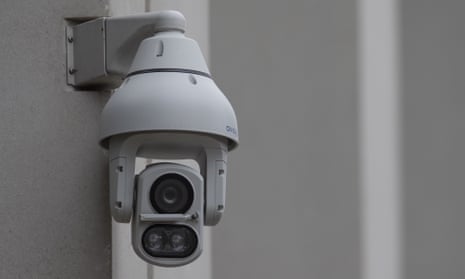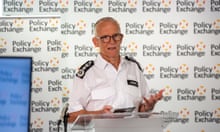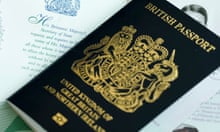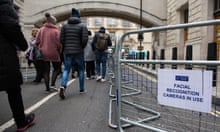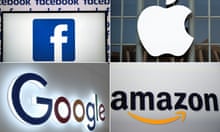Privacy campaigners have warned of an “epidemic” of facial recognition use in shopping centres, museums, conference centres and other private spaces around the UK.
An investigation by Big Brother Watch (BBW), which tracks the use of surveillance, has found that private companies are spearheading a rollout of the controversial technology.
The group published its findings a day after the information commissioner, Elizabeth Denham, announced she was opening an investigation into the use of facial recognition in a major new shopping development in central London.
Sadiq Khan, the mayor of London, has already raised questions about the legality of the use of facial recognition at the 27-hectare (67-acre) Granary Square site in King’s Cross after its owners admitted using the technology “in the interests of public safety”.
BBW said it had uncovered that sites across the country were using facial recognition, often without warning visitors.
Secret police trials had taken place last year in Sheffield’s Meadowhall shopping centre, which could have scanned more than 2 million visitors. A spokesperson for its owner, British Land, said: “We do not operate facial recognition at any of our assets. However, over a year ago we conducted a short trial at Meadowhall, in conjunction with the police, and all data was deleted immediately after the trial.”
Up to 15 million visitors to the Trafford Centre in Manchester could also have been scanned by facial recognition, until an intervention by the surveillance camera commissioner pressured the site to stop using the technology.
It also emerged that Liverpool’s World Museum had scanned visitors’ faces during an exhibition on Chinese history in 2018. The National Museums Liverpool group, which controls the site and others, including the International Slavery Museum, told BBW it was “currently testing feasibility of using similar technology in the future”.
In Birmingham, the Millennium Point conference centre revealed in its privacy policy that it used facial recognition “at the request of law enforcement”. The area around the centre has been the scene of demonstrations by trade unionists and anti-racism campaigners.
Quick GuideWhat is facial recognition - and how do police in the UK use it?
Show
What is facial recognition?
This is a catch-all term for any technology that involves cataloguing and recognising human faces, typically by recording the unique ratios between an individual’s facial features, such as eyes, nose and mouth.
Why is it in the news?
After a trial of the technology, London's Metropolitan police have said they will start to use it in London within a month. On Friday, the force said it would be used to find suspects on “watchlists” for serious and violent crime, as well as to help find children and vulnerable people. Scotland Yard said the public would be aware of the surveillance, with the cameras being placed in open locations and officers handing out explanatory leaflets.
How is it used in policing?
The technology greatly improves the power of surveillance. At the simple end, a facial recognition system connected to a network of cameras can automatically track an individual as they move in and out of coverage, even if no other information is known about them. At the more complex end, a facial recognition system fuelled by a large database of labelled data can enable police to pinpoint a person of interest across a city of networked cameras.
Why is it controversial?
Facial recognition frequently sparks two distinct fears: that it will not work well enough, or that it will work too well.
The first concern highlights the fact that the technology, still in its infancy, is prone to false positives and false negatives, particularly when used with noisy imagery, such as that harvested from CCTV cameras installed years or decades ago. When that technology is used to arrest, convict or imprison people, on a possibly faulty basis, it can cause real harm. Worse, the errors are not evenly distributed; facial recognition systems have regularly been found to be inaccurate at identifying people with darker skin.
But the technology will improve, meaning the second concern is harder to shake. This is the fear that facial recognition inherently undermines freedom by enabling perfect surveillance of everyone, all the time. The fear is not hypothetical; already, Chinese cities have proudly used the technology to publicly shame citizens for jaywalking, or leaving the house in their pyjamas.
Alex Hern Technology editor
The privacy policies of a number of casinos and betting shops also refer to their use of facial recognition surveillance, including Ladbrokes, Coral and the Hippodrome Casino London.
Silkie Carlo, BBW’s director, described the rollout as an “epidemic of facial recognition in the UK”. She said: “The collusion between police and private companies in building these surveillance nets around popular spaces is deeply disturbing. Facial recognition is the perfect tool of oppression and the widespread use we’ve found indicates we’re facing a privacy emergency.”
Last month, the House of Commons science and technology committee said authorities should cease trials of facial recognition technology until a legal framework was established.
In a report on the government’s approach to biometrics and forensics, the MPs referred to automatic facial recognition testing by the Metropolitan police and South Wales police, noting that an evaluation of both trials by the Biometrics and Forensics Ethics Group had raised questions about accuracy and bias.
